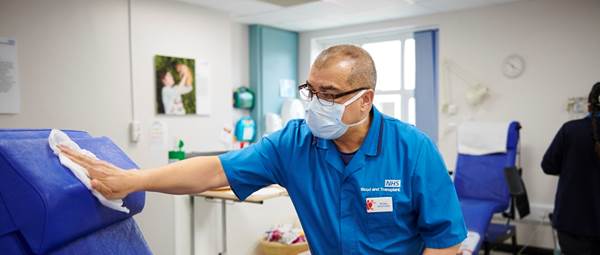Blood safety
Donor and patient safety is very important to us.
Whether we are taking blood donations, manufacturing blood components for hospitals or transporting them, we have rigorous, modern processes that ensure the health and wellbeing of patients and donors. You and your blood are precious and potentially life-saving, so this is how we protect you:
Why is blood safety important
Safety is at the forefront of everything we do. Before our donors give blood, we ask them to complete a donation safety check. This comprehensive questionnaire about medical history and lifestyle enables us to assess whether it is safe for donors to give blood and to give it to someone else.
There are a number of infections that can be passed on through infected blood. We routinely test for a range of infections including HIV, hepatitis B, C and E, syphilis and carry out additional tests for things like West Nile Virus if a donor has travelled to an area where this is common. We cannot test for all infections therefore the information collected on the donation safety check form is crucial in assessing whether a donor is safe to donate
If we can prevent donors with higher risk factors from giving blood during this 'window period' between infection and detection, we can help to ensure the safety of our blood supply to vulnerable patients.
Donors are also asked to read our donor consent booklet so they understand what to expect from the donation process and also the importance of accurately answering the donation safety check questions.
A safe supply of blood
Together, the health check and the booklet are critical tools in protecting the safety of blood.
- See some of the typical reasons why you may not be able to give blood or may be advised to wait before donating.
- Read our donor consent booklet
What are the regulations around blood safety?
There are regulations that standards for quality and safety for the collection, testing, processing, storage and distribution of human blood and blood components.
Several organisations share responsibility for ensuring the safety of blood in England, including NHS Blood and Transplant, the Department of Health and Social Care, the UK Health Security Agency and the Medicine and Healthcare Products Regulatory Agency.
Modern safety standards are rigorous. We follow all the regulations and guidelines to keep donors, patients and clinicians as safe as can be. Standards are frequently reviewed, and we are regularly inspected by independent regulators.
What are the safety precautions when handling blood samples?
Our donor selection guidelines help us to screen donors so they can donate safely. Each donor completes an extensive safety check questionnaire before every donation.
We may ask donors to wait a little while (known as a deferral) before donating if they may have been exposed to an infection, for example through travel or recent higher risk behaviour.
All donations are routinely tested for infectious diseases. If a blood donation tests positive for infection then it will not be given to patients, and the donor is given support and advice.
Safe storage and delivery
Blood donations are taken by our transport team directly to one of our blood testing and manufacturing centres. The sorting, recording, testing and storage of blood all takes place in modern laboratories using the latest technology. Modern safety standards are very rigorous and follow strict guidelines. Once all the testing is complete and passed, each pack of blood can be labelled and placed into controlled storage, ready to be sent to hospitals.
Any blood donation that tests positive for infection is taken out of the supply chain and the donor contacted with advice and support. The quality and efficiency of this service is very important to us, and we are regularly inspected by independent regulators to ensure we maintain our high standards.
We are able to monitor stock levels of blood on a 'live' basis, enabling us to provide hospitals with automatic top up deliveries. This streamlined process means more patients safely receive the right blood, at the right time, with less wastage.
We are:
- regulated by the Medicines and Healthcare products Regulatory Agency (MHRA)
- compliant with blood safety and quality regulations
- compliant with recommendations from the Advisory Committee on the Safety of Blood, Tissues and Organs (SaBTO)
Find out more with our donor consent booklet
Our donor consent booklet explains the blood donation process, the importance of our health check questions for safety and the potential side effects of donating blood.






